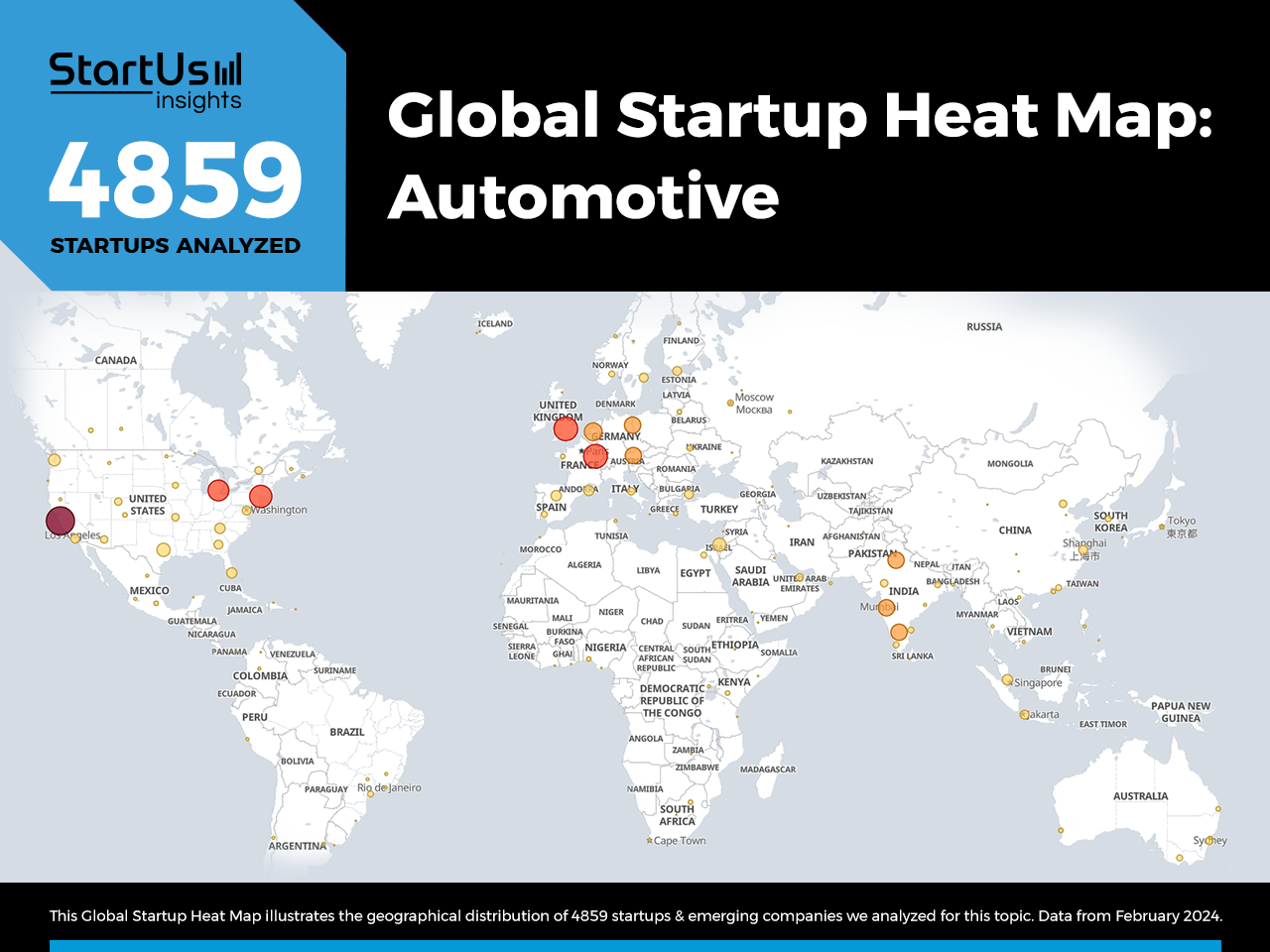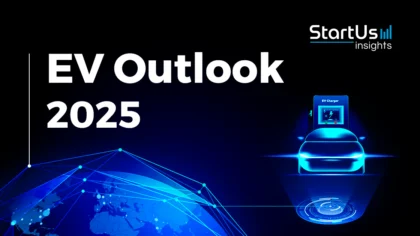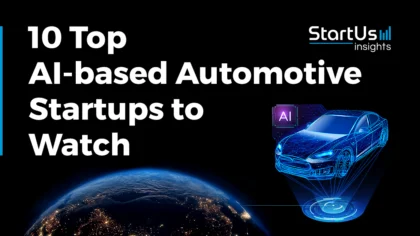Accelerate Productivity in 2025
Reignite Growth Despite the Global Slowdown
We’ve published a brand-new, data-rich report on the Latest Automotive Industry Trends.
Read the Updated 2025 Automotive Industry Trend Report!
In 2024, the automotive industry is increasingly integrating cutting-edge technologies into its operations. Key automotive industry trends include a significant rise in electric vehicle production, a growing market for pre-owned vehicles, and an uptick in digital car sales. Alongside established technologies like AI and big data analytics, the industry is also embracing the Internet of Things (IoT) and blockchain for diverse applications. This technological evolution is reshaping the automotive landscape, driving innovation and efficiency.
This article was published in April 2020 and updated in February 2024.
Innovation Map outlines Top 10 Automotive Trends & 20 Promising Startups
For this in-depth research on the Top Automotive Industry Trends and startups, we analyzed a sample of 4859 innovative automotive startups & scaleups worldwide. This data-driven research provides innovation intelligence that helps you improve strategic decision-making by giving you an overview of emerging technologies in the automotive industry. In the Automotive Innovation Map below, you get a comprehensive overview of the innovation trends & startups that impact your company.
What are the Current Trends in Automotive Industry (2024)?
- Autonomous Vehicles (AVs)
- Vehicle Connectivity
- Electrification
- Shared Mobility
- Artificial Intelligence
- Big Data & Analytics
- Human-Machine Interfaces
- Blockchain
- 3D Printing
- Internet of Things
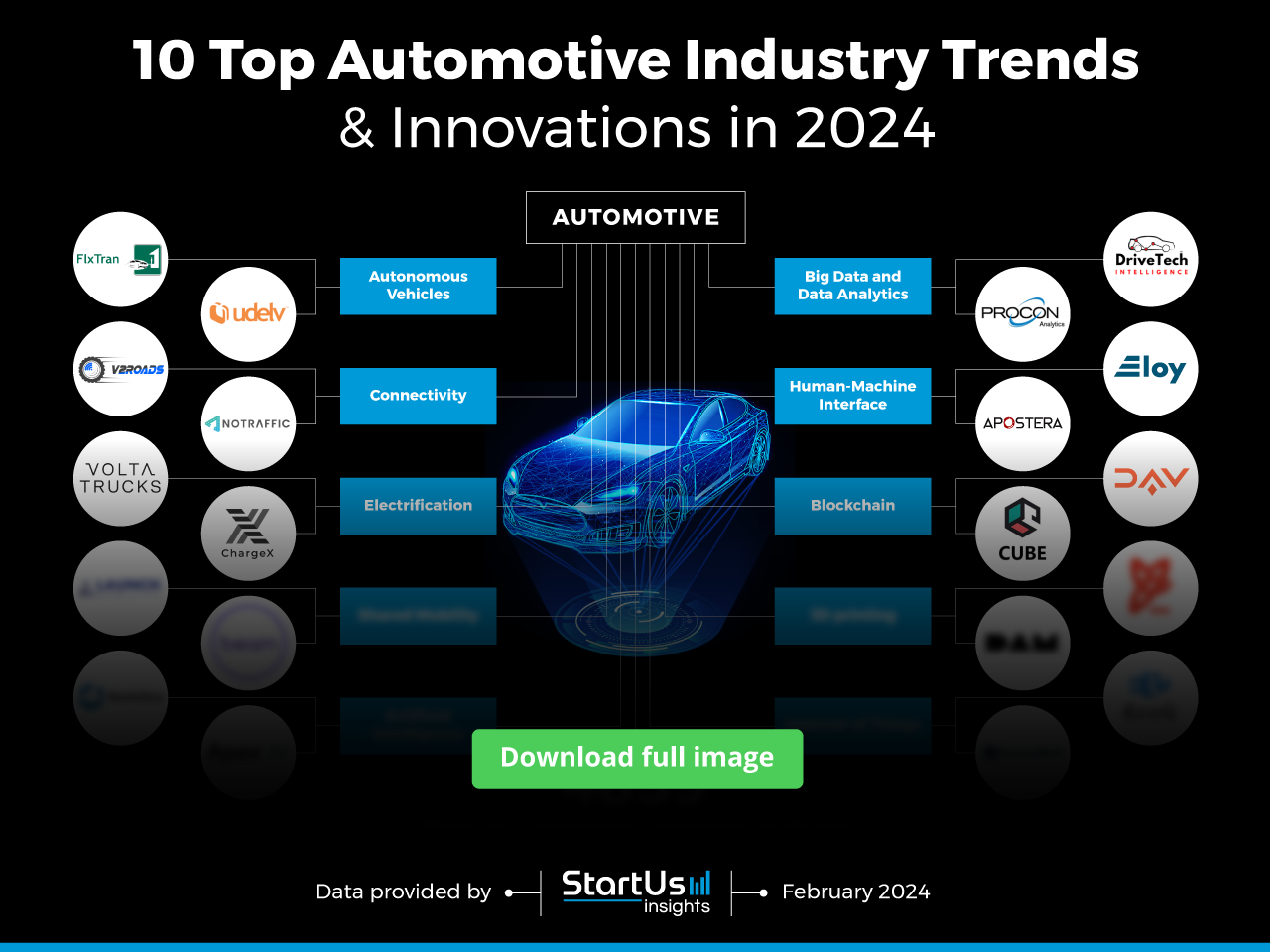
These insights are derived by working with our Big Data & Artificial Intelligence-powered StartUs Insights Discovery Platform, covering 4 790 000+ startups & scaleups globally. As the world’s largest resource for data on emerging companies, the SaaS platform enables you to identify relevant technologies and industry trends quickly & exhaustively.
Tree Map reveals the Impact of the Top 10 Automotive Industry Trends
The Tree Map below illustrates the top 10 automotive trends that will impact companies in 2024. Emerging companies are working to build the first fully autonomous vehicle for city roads, which in turn accelerates the advancements in-vehicle connectivity and IoT.
Further, as countries look to move away from fossil fuel use, a significant number of emerging electrification startups develop electric vehicles and the associated charging infrastructure. Another way to reduce the number of cars on the road involves promoting and creating shared mobility solutions that include first and last-mile connectivity along with urban mass transit.
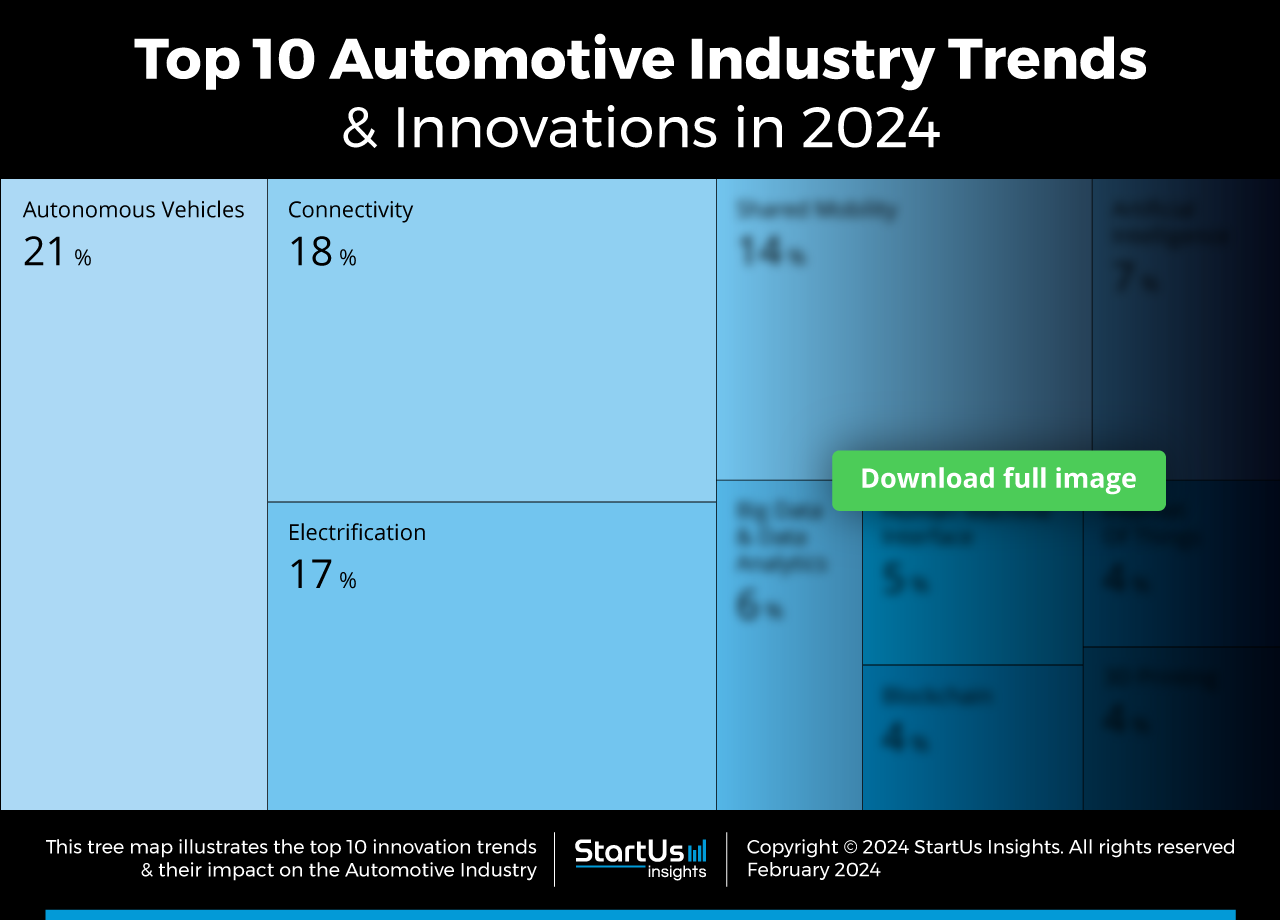
Global Startup Heat Map covers 4859 Innovative Automotive Startups & Scaleups
The Global Startup Heat Map below highlights the global distribution of the 4800+ exemplary startups & scaleups that we analyzed for this research. Created through the StartUs Insights Discovery Platform, the Heat Map reveals high startup activity in the US, Europe, and India.
Below, you get to meet 20 out of these 4859 promising startups & scaleups as well as the solutions they develop. These 20 automotive companies are hand-picked based on criteria such as founding year, location, funding raised & more. Depending on your specific needs, your top picks might look entirely different.
Interested to explore all 4800+ automotive startups & scaleups?
Top 10 Automobile Industry Trends & Innovations (2024)
1. Autonomous Vehicles (AVs)
Autonomous vehicles (AVs) are advancing transportation by minimizing the need for human drivers and enhancing last-mile delivery efficiency. These vehicles improve public transport safety by reducing accidents caused by human error. LiDAR sensors enable precise 3D mapping, crucial for vehicle navigation and obstacle detection. AI algorithms process vast data from sensors and cameras, enhancing decision-making for safe, efficient driving.
Moreover, V2X communication systems allow vehicles to interact with each other and infrastructure, improving traffic flow and reducing accidents. These innovations collectively propel the industry towards safer, more efficient transportation. Consequently, the global autonomous vehicle market size is projected to reach USD 448.6 billion by 2035, growing at a CAGR of 22.2%.
FlxTran develops Autonomous Vehicles for Unused Railway Tracks
US-based startup FlxTran develops a new transportation system using self-driving vehicles on abandoned railroad tracks to provide fast regional transport to connect smaller communities. The system uses an app to schedule rides on autonomous vehicles, cutting down trip times compared to the available commuting options. FlxTran’s approach improves connectivity and access to opportunities beyond major cities.
Udelv manufactures Self Driving Last Mile Delivery Vehicles
The US-based startup Udelv provides autonomous vehicles for last-mile deliveries. It combines advanced AI algorithms and hyper-speed teleoperations for human-assisted guidance in unique situations. The startup’s vans have a payload capacity of approx. 360 kg (800+ lbs) and reach speeds up to approx 100 km/h (60 mi/h). The vans deliver groceries from nearby stores and send out a push notification when the order arrives.
2. Vehicle Connectivity
Modern vehicles are now equipped with a unique digital identity, making it easier to track and share data for applications like insurance, driver safety, predictive maintenance, and fleet management. This data sharing enhances the overall mobility ecosystem.
Startups and scaleups are innovating in vehicle connectivity, enabling vehicles to communicate with each other (V2V), connect to the electric grid (V2G), interact with public infrastructure (V2I), and leverage data in new ways (V2X). These advancements are driving the future of connected vehicles, which are increasingly becoming a standard feature in new cars.
V2ROADS simplifies Vehicle-to-Everything (V2X) Connectivity
Hungarian startup V2ROADS offers a range of products and services tailored to the V2X ecosystem. They provide V2X applications, services, and communication stacks specifically designed for on-board units (OBUs) and road-side units (RSUs). Further, its V2X-cloud system implementation guarantees uninterrupted connectivity between vehicles and infrastructure. Finally, its V2AP (V2X Integration Platform) is a server-side software to amplify V2X services to elevate road safety and efficiency.
NoTraffic facilitates Digital Road Infrastructure Management
Israeli startup NoTraffic develops an AI-powered traffic signal platform that digitizes road infrastructure management and connects drivers to the city roadways to manage various traffic-related challenges. The data of all road users is streamed and processed in real-time to empower smart mobility. The solution also serves as the base for additional services such as micropayments and micro-mobility.
3. Electrification
The urgency to shift from fossil fuels to electric mobility solutions is driven by dwindling reserves and environmental concerns. To encourage wider adoption of electric vehicles (EVs), key challenges need addressing: high costs, limited battery life, inadequate charging infrastructure, fleet electrification, and the development of renewable energy-powered charging grids.
Startups are actively working on these electrification solutions, focusing on innovations like improved battery technology, expanding charging networks, and integrating EVs into a sustainable energy ecosystem. These efforts are crucial in tackling global greenhouse gas emissions and advancing the transition to electric mobility. Owing to these advancements, the EVs market worldwide is projected to grow by 9.82% (2024-2028), resulting in a market volume of USD 906.7 billion in 2028.
Volta Trucks manufactures Electric Trucks
Swedish startup Volta Trucks makes Volta Zero, an electric truck for urban deliveries. This vehicle’s design prioritizes driver safety and comfort, featuring a central driving position and panoramic vision for enhanced visibility. The Volta Zero addresses sustainability by enabling zero tailpipe emissions, contributing to cleaner city environments.
The truck’s design removes the internal combustion engine, advancing commercial vehicle safety standards, and protecting pedestrians and other road users. Volta Trucks also offers leasing or purchasing options, and integrates services like maintenance, charging infrastructure, and training through its truck-as-a-service model. This simplifies the transition to electric vehicles for fleets, reducing environmental impact and promoting safer urban transport.
ChargeX specializes in Modular Electric Vehicle Charging Solutions
German startup ChargeX offers a modular EV charging solution that converts parking spaces into charging stations. The startup’s platform, Aqueduct, is easy to install, has 4 charging modules with up to 22kW, provides monthly reports, and uses a Typ2 charging cable. The solution recognizes the power requirements of every car and automatically controls the charging speed for each vehicle.
4. Shared Mobility
Connected vehicles are fostering new business models centered on shared mobility, offering an alternative to traditional vehicle ownership. This shift supports mobility-as-a-service (MaaS), reducing the number of idle vehicles and addressing urban transportation needs without adding more cars.
These solutions decrease fleet wait times and cut pollution from petrol or diesel vehicles. The trend towards shared mobility, including ride-hailing services, is gaining momentum, potentially leading to a future where private car ownership is less common and on-demand transportation services become more prevalent.
Launch Mobility streamlines Shared Mobility
The US-based startup Launch Mobility develops a platform for a range of shared mobility solutions. The platform LM Mission ControlTM offers free-floating or station-based car sharing, advanced shuttle services, shared dockless scooters, keyless rental programs, and peer-to-peer shared mobility. The LM Mission Control dashboard allows business users to manage their fleets. Further, their drivers use out-of-the-box or white-labeled apps to manage reservations or remotely access vehicles.
Beam develops Electric Scooters
Singapore-based startup Beam focuses on e-scooters to promote shared mobility in the Asia-Pacific region. Their scooters use an aviation-grade aluminum frame and are customized for sharing, safety, reliability, and durability. Users discover the nearest Beam scooter on the app and park it in visible public spots after the ride. Further, the micro-mobility platform offers a sustainable alternative to short-distance rides and helps regulate traffic flow in cities.
5. Artificial Intelligence (AI)
AI technologies like machine learning, deep learning, and computer vision are advancing robotic automation. They play pivotal roles in guiding self-driving cars, managing fleets, enhancing driver safety, and refining services such as vehicle inspections and insurance.
AI is also transforming automotive manufacturing by speeding up production and cutting costs. In 2024, the industry is expected to see advancements in fully autonomous vehicles, predictive maintenance, and advanced safety features, providing a more personalized driving experience tailored to individual preferences.
RevitsOne provides AI-based Fleet Management
Indian startup RevitsOne offers AI-powered fleet-management software that is suitable for fleets of varying sizes. The startup’s vehicle management system provides insights into speed, running vitals, and health information. Drivers benefit from Voicera ID, a voice-based virtual assistant that helps them keep track of the information they need. Additionally, the onboard speed recorder limits the speed to discourage dangerous driving behaviors.
Apex AI offers an Automotive Data Management Platform
The US-based startup Apex AI enables automotive companies to implement complex AI solutions. Apex.OS runs on automotive electronic control units (ECUs) and offers robust, reliable, and secure APIs to develop autonomous mobility solutions. ApexAutonomy offers modules to build 3D perception, localization, and control to enable autonomous vehicles. Lastly, MARV.Automotive is a configurable and extensible data management platform that reliably transmits data from the vehicle to the cloud.

6. Big Data & Analytics
Big data and advanced analytics play a crucial role in decision-making throughout a vehicle’s lifecycle. Vehicle-generated data facilitates predictive maintenance, fleet management, and accident response. Additionally, customer data drives sales, optimizes supply chains and informs new vehicle designs.
The big data market in automotive is growing, with a projected market size of USD 5.92 billion in 2024, expanding at a CAGR of 16.78% to reach USD 12.86 billion by 2029. Startups are developing big data solutions to help manufacturers and related industries streamline operations and maximize profits.
Procon Analytics builds Automotive Finance
The US-based startup Procon Analytics leverages big data to offer a solution for automotive finance. The solution captures millions of data points in real time and analyzes them to enable lenders to instantly assess and reduce risk. This allows Buy Here Pay Here (BHPH) dealers to expand their businesses and extend credit to high-risk customers. Further, this also offers software solutions for fleet and asset tracking as well as connected cars.
Drive-Tech AI accelerates Vehicle Testing Analysis
India-based startup DriveTech-AI builds solutions centered around optimizing the vehicle testing process through smart solutions. Its suite of platforms and solutions allows automotive OEMs to accelerate testing data analysis and enhance automation and team collaboration. For example, its StellarAi data intelligence platform offers templates to quickly identify engineering variables, trends, and vulnerabilities.
Further, its Craidlr ATX-G gateways are integral to the surface temperature & vibration monitoring solution, catering to diverse automotive testing needs. These gateways, combined with advanced transducers, facilitate real-time data collection.
7. Human-Machine Interfaces (HMI)
The evolution of self-driving and connected cars is simplifying driver-vehicle interaction. Human-machine interfaces (HMIs), including voice-based and haptic feedback systems, are expanding control over various car functions. These interfaces enhance safety and enjoyment while driving.
Additionally, smart virtual assistants are emerging as a key HMI feature, aiding drivers and passengers in interacting with vehicles and external services. The global Automotive Human Machine Interface market, valued at USD 70.41 billion in 2022, is expected to grow significantly, reflecting these advancements in automotive technology.
Eloy provides Connected Car Solutions
Eloy is a UK-based startup that develops a suite of connected vehicle products. EloyMessage broadcasts fixed or dynamic visual and audio messages directly into vehicles, reducing driver distraction with patented technology. EloySignals utilizes AI to optimize traffic flow, advising drivers on stopping or proceeding, and prioritizing emergency vehicles and vulnerable road users.
EloyPark directs vehicles to available parking spaces, improving traffic flow and parking efficiency. EloyRoute generates fixed routes and dynamic diversions, redistributing traffic to avoid congestion and hazards. EloyTrack monitors routes and vehicles in real time, identifying congestion hotspots for efficient traffic management. These solutions primarily benefit traffic managers, urban planners, and drivers by improving traffic flow and driving experiences
Apostera specializes in Advanced Driver Assistance Systems (ADAS)
German startup Apostera offers an advanced driver-assistance system (ADAS). The startup’s platform combines augmented reality (AR), smart camera, and surround-view monitoring to illuminate the route on turns, curves, slopes as well as complex junctions. This assists the drivers in keeping lanes, prevents collisions, and enables autonomous driving options. Moreover, the solution is customizable to any car model or specific OEM requirements.
8. Blockchain
Blockchain technology is increasingly being utilized in the automotive industry for various applications. It enables secure data sharing for connected and shared mobility solutions, including ride-hailing, urban transportation, and delivery services.
Additionally, blockchain is instrumental in verifying the supply chain of automotive parts, ensuring that materials and components are sourced from legal and trustworthy suppliers. The global automotive blockchain market is experiencing significant growth — it is projected to reach USD 6.11 billion by 2032.
Cube Intelligence builds Blockchains for Autonomous Vehicles
British startup Cube Intelligence develops a blockchain-based security platform for autonomous vehicles. The startup’s technology utilizes hash codes to block malicious attacks or hacking attempts on autonomous cars and connected cars. The hardware used gathers real-time data on mobility and emissions. Additionally, Cube Intelligence offers ride-hailing and valet parking services for AVs, as well as smart parking management systems.
DAV offers a Decentralized Autonomous Vehicle Platform
Israeli startup DAV offers a decentralized autonomous vehicles platform based on blockchain technology. The platform allows autonomous vehicles to discover AVs, service providers, or clients around them. The vehicle-to-vehicle (V2V) communication is either on-blockchain, with smart contracts or off-blockchain using DAV’s protocols. The startup develops protocols for drone charging networks, drone flight planning, and open mobility.
9. 3D Printing
3D printing significantly benefits the automotive industry in three key areas. Firstly, it accelerates the design and testing process through rapid prototyping. Secondly, it allows for on-demand manufacturing of custom spare parts.
Lastly, it enables the production of lighter, stronger, and more durable automotive parts using composite materials. The automotive 3D printing market is expected to reach USD 1.8 billion by 2026, growing at a CAGR of 11.1% from 2021-2026, highlighting its increasing importance in automotive manufacturing and design.
Distributed Additive Manufacturing enables Large Scale Sustainable Parts Production
UK-based startup Distributed Additive Manufacturing (DAM) offers 3D printing services including design, building, and finishing of parts. It offers more sustainable 3D printing by developing its own large-scale printing hardware and using fully recycled composite materials. DAM can print parts as large as 1000x3000x1000mm using engineering-grade recycled plastics. In addition to prototyping, DAM provides full-scale manufacturing services too.
Moi manufactures 3D Printed Automotive Parts
Italian startup Moi combines thermosetting composite materials and 3D printing to manufacture high-performance parts for the automotive industry. Moi uses continuous fiber manufacturing (CFM) technology, robotic intelligence, and digital fabrication to deposit fibers. As a result, the solution is easily scalable for producing composites for panels, frames, and interior components. The startup also serves other industries, such as aerospace, construction, and biomedical.
10. Internet of Things (IoT)
IoT is pivotal for enabling secure communication between vehicles and infrastructure, enhancing road safety, reducing traffic congestion, and cutting down pollution and energy use through efficient fleet management. Emerging companies are developing advanced sensing technologies to collect extensive vehicle data and enable vehicles to better understand their surroundings.
IoT also facilitates automated payments for fuel and tolls. Due to these advancements, the global automotive IoT market is anticipated to reach USD 56 billion by 2026 at a CAGR of 19% during the period from 2021 to 2026.
EcoG builds an Electric Vehicle Charging Platform
Operating from Germany and the US, EcoG is a startup offering an IoT-based operating system and platform for EV charging. The startup provides manufacturers with tools that make the development and maintenance of EV charging infrastructure simple, fast, and scalable. It also allows operators to integrate services and microservices in the chargers to make the charging process profitable. In addition, the solution works with any EV charger and enables new features to be shipped throughout the network.
KonnectShift provides IoT-based Fleet Optimization
Canadian startup KonnectShift provides IoT solutions to optimize fleet and asset management. The startup develops Konnect – GS01, an automatic electronic logging device (ELD) to continuously track vehicular health. The solution includes route planning and optimization for real-time dispatch, advanced analytics to enable alerts regarding driving, vehicles, and fuel, predictive maintenance alerts to reduce downtime, as well as the development of driver management apps.
Discover all Automotive Technologies & Startups
Advancements in additive manufacturing close to production facilities, AI-driven automated inspections, big data utilization in design and production, and HMI technologies are streamlining manufacturing processes in the automotive industry. The drive towards electric and autonomous vehicles is further bolstered by progress in machine learning and IoT.
The trends in automobile industry and startups outlined in this report only scratch the surface of automotive innovations that we identified during our in-depth research. Identifying new opportunities and emerging technologies to implement into your business early on goes a long way in gaining a competitive advantage. Get in touch to easily and exhaustively scout relevant technologies & startups that matter to you.
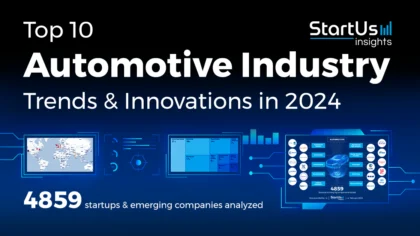

 WATCH THE VIDEO VERSION
WATCH THE VIDEO VERSION 